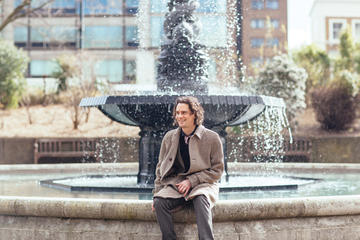Rev Canon Chris Russell might not be used to the limelight, but since his appointment as Justin Welby’s adviser for evangelism last year, things have started to change. Lucinda van der Hart hears his story.

Chris Russell was sitting with his undergraduate theology buddies in the back row of a Durham University lecture theatre when an older, unknown ordinand made his way over and filled a vacant seat among them. They began talking post-lecture in what was the beginning of a friendship that’s still going strong years later.
The unknown ordinand is now better known as Justin Welby, Archbishop of Canterbury. Since his appointment in March last year, Welby has stated three priorities for his time in office. First, prayer and renewal of the Church’s spiritual life; then reconciliation – both within the Church and as an agent in the world – and finally, the re-evangelisation of the UK. Identifying Russell as a pioneer in mission, Welby created him a unique position on his staff as archbishop’s adviser for evangelism and witness, a post he took up in June 2013.
Not unlike his self-deprecating boss, Russell says he was ‘surprised’ by the appointment. ‘I’m sure many other people were too,’ he says. Listening to him recount the tale of how 13 years ago he planted what’s now a vibrant, growing, youth-focused church in Reading, I’m not so sure. His father was a vicar. His parents, he says, did a fantastic job of helping him separate out the challenges of having a vicar as a dad from those of following Jesus. This meant that when he kicked back against the pressures of being a vicar’s son, it didn’t mean rebelling against faith itself. ‘I’ve never felt the need to rebel against God,’ he says. ‘Why would I? God is life and joy and hope. God is vibrant living.’
As a teenager he became very involved in the youth group in his father’s church in Nottingham. It was there, he says, that the seeds of his passion for evangelism were sown. ‘I just thought: “If faith is this great, why wouldn’t I share it?”’ he says. At 18, Russell spent his gap year working for a church on the council estates of Birkenhead, although at that time, he had no intention of becoming a vicar. He went on to study theology, and then worked in politics before training for ordination. After his curacy in south-east London he spent a year at Soul Survivor, Watford – gearing up to planting St Laurence, in Reading, where he remains vicar alongside his new post at Lambeth.
Like others on the archbishop’s staff, Russell is not keen on being in the public eye. He tells me he’d rather chew off his right arm than have his photo taken (although he kindly conceded to our taking a few snaps). But like it or not, his new role does throw him into the limelight, one of many changes to which he has had to adjust in the last 12 months.
Growing up, you had no plans to become a vicar. How did it happen?
I realised that for some reason, God had put this desire and this longing in me to tell people about Jesus and to serve his community in being who the Church can be. When I left university, I went to work in parliament for Labour MP Paul Boateng. I did two years as a researcher. Politics was tempting because the House of Commons is such an extraordinary building. You got the impression, if you were working in Parliament, that this was the most important place in the country. It was really heady.
I would have been useless as an MP – but I do still feel really strongly about politics. I am part of the generation that [sees] no separation between faith and politics and policies and social action. There’s not a Rizla you can put between them.
During that time, I tried to ignore – and then realised I couldn’t ignore – a call to ordained ministry in the Church of England.
I’ve heard that your church in Reading town centre is a bit unusual. Tell us about it.
At St Laurence’s, we talk about being a multi-generational church, which has got a particular missiological orientation around young people. St Laurence’s isn’t a youth church, although youth churches are great. But everybody knows that if you come to St Laurence’s, you are coming to be involved in a particular church that has a bias towards young people. Almost all of our money, apart from our parish share and heating bills, gets spent on young people.
Tell us the story of how you planted...
We planted in the late 90s – it was before Mission-Shaped Church, before Fresh Expressions, or anything like that. This was passionately what I and my wife, Belinda, wanted to do, but there were a few closed doors. Someone in church hierarchy said, ‘Well, it’s a great idea to do a church that is accessible to young people and grows young people, but it will never happen. It is completely impossible in the Church of England.’ But I was like, ‘No, no, no. Let’s not give up on
this.’
St Laurence’s in Reading had a dwindling congregation at that time. It was a huge medieval building, but there were 11 people in the church. There was a review with the local bishop and the churches in the town centre and they came up with this idea that there should be a church that was seeking to reach young people who didn’t have any faith.
We left Soul Survivor Watford in order to plant in Reading in January 2001, with a team of about ten. Mike Pilavachi had said to us about spending time in Watford: ‘Come to Watford, be part of Soul Survivor, share your vision and take whoever will go with you.’ And so we did that. It was amazingly generous of him.
On arriving at St Laurence’s the bishop kind of put me up against a wall and said, ‘This can’t grow through transfer growth. I don’t want all the Christian teenagers in Reading now coming here. This must grow through young people coming to faith.’ For the last 13 years, we’ve been exploring how that can happen.
What have you learnt about how to grow a church?
We learnt really early on that it is not about programmes or glossy fliers; it is about building relationships with young people.
I had this idea that I would write to schools and offer to do RE lessons and assemblies for them. But a guy called Pete Ward who was part of the team said, ‘This is just disastrous, Chris. You will just become an educator. Christian education is brilliant, but if that’s what you want to do, it isn’t building a church.’
We ploughed everything into growing relationships with young people for four or five years. We particularly spent loads of time in schools with young people who were right on the edge of exclusion or had been excluded, and we continue to do that.
I thought the church would grow more quickly than it did. So we talked to Stephen Cottrell, who was by then the Bishop of Reading (who is a phenomena – a wonderful evangelist himself). And we said, ‘How come we’re putting all this work in but we are not seeing what we want?’ Obviously there are no formulas in ministry, and it’s almost a huge mistake to even think that there might be. But we said, ‘We need some strategy here.’
He said, ‘So how many young people became Christians last year?’ And we went, ‘About four or five.’ He said, ‘That’s not enough. So tell me, where did you give young people the opportunity to become Christians?’ We looked around and we realised that…someone could remember once.
So as church or youth leaders, do we need to make more regular opportunities for people to commit their lives to Jesus?
Absolutely. What Stephen Cottrell did then, was introduce us to what we still live by. He said, ‘Look, there’s a quadrant. You have got contact, nurture, commitment and growth. Out of all your activities, contact is where you get to know young people. Nurture is where you develop those relationships, so you need to know everybody’s name. Then you invite people who you have nurtured and who you have got a relationship with to commit themselves to Jesus Christ, and you grow that. The reason you’re not seeing young people commit themselves to Jesus Christ is because you are not really inviting them to be committed to Jesus Christ.’
THE REASON YOU’RE NOT SEEING YOUNG PEOPLE COMMIT THEMSELVES TO JESUS CHRIST IS BECAUSE YOU ARE NOT REALLY INVITING THEM TO
He also said, ‘In everything you do, you should know why you do it.’ And so now, at St Laurence’s, we do 21 things a week and we know exactly why we do what we do.
Your book, Ten Letters, is essentially ten letters on faith and spirituality that you would write if you had just one year left to live. Do you think it would be helpful for us as Christians to reflect on our own death a bit more?
Every year on my birthday I assume this is going to be the last year of my life. I didn’t realise that thought wasn’t shared by everybody else…
David Ford says in the wonderful book, The Shape of Living (Canterbury Press) that Jesus lived with an unrepressed sense of death; that the key to Jesus Christ’s freedom was his ability to be able to embrace death. Now, I know that embracing death is incredibly difficult. So let’s not be romantic about this. But I wonder if facing who we are and our own death does bring a clarity to our living. Not in the sense of thinking, ‘I have got to do something worthwhile.’ Trying to make something of ourselves is just disastrous.
Bonhoeffer says in Letters and Papers from Prison (Fontana) that the idea of either trying to become a saint or trying to make something of yourself is a terrible, terrible thing to fall into. He said the big question is: how is the future generation going to live? Knowing that I am going to die means that I need to concentrate on the people who are coming after me, and how [they are] going to live.
Your new role is all about helping implement the archbishop’s priority of the re-evangelisation of England. What have you been up to so far?
When it comes to evangelism in the UK, there’s loads of expertise and lots of good practice already taking place. What I have tried to do in the first six months is a mapping exercise, to find out what’s already going on that would call itself evangelism. The second thing is, I have tried to listen. People who have particularly got a gifting in evangelism have come to Lambeth. They’ve shared their wisdom and told me what they think is working, and what they think are the challenges. The archbishop is really committed to understanding what’s going on around the country, and how this can be shared and blessed and can multiply.
The archbishop’s task group on evangelism is also just about to begin, which he is going to chair himself. The Archbishop of York and his staff are really involved too. We’ll be exploring how to bring cultural change in the Church: one that puts evangelism front and centre.
What have you gleaned from your research so far? How do we need to change our approach to evangelism in order to bring that cultural change in the Church?
Intentionality. Let’s be deliberate in wanting to see people come to faith. I know that sometimes that just happens; I know that sometimes people just turn up at the door of churches and ask questions and come to faith. I know that God works, of course, outside of the boundaries of the Church and what the Church does – but all the statistics and experience shows that on the whole, churches grow when they make evangelism a deliberate priority. When they pray about it, and when they invest in it. When they, as a church community, decide and believe and live as if it really is the best thing for all their family and their friends to hear Jesus Christ call them; to hear Jesus Christ say, ‘Come, follow me.’
Paul teaches that some are called to be ‘evangelists’. Do we overemphasise that, so that not everyone in Church gets involved in evangelism?
Evangelism needs to be at the forefront of every church’s priority. It is not an optional extra. The Church is, by definition, for other people…as Martin Luther said, ‘The definition of a sinful heart is a heart curved in on itself.’ The definition of a sinful church is a church curved in on itself. Because of who Jesus Christ is and because of what he has done, it is absolutely paramount that we live for other people.
Not every Christian is called to be an evangelist, but everyone is called to be a witness. Jesus says in Acts 1:8, ‘you will be my witnesses’. Witness isn’t a verb; he doesn’t say you will witness, he uses a noun – ‘you will be my witnesses’. All of us, every person who Christ has called to follow him, is a witness of Jesus Christ. The question is whether we are a good witness or a bad witness.
If I am a witness, I don’t need to learn a formula, I don’t need to learn an answer that I can give in order to be a good witness. I simply need to say what I know. We are entirely qualified to be witnesses because Jesus Christ calls us and sends his Spirit to help us. We need no other qualifications than those. The Church is to enable people in their witness and then turn the heat up on those people who have evangelistic gifts…
How do you reconcile being evangelism-focused with the archbishop’s commitment to good interfaith relations?
If evangelism is a no-go area in terms of interface with people of all religions, then really, what are we doing? Of course there are real sensitivities here. This is about dialogue with real people. My family and I were invited by the local rabbi in Maidenhead to have Shabbat with them on Friday. They welcomed us to their home; it was a wonderful experience for us. They were just so hospitable. We sat down and the rabbi said, ‘So, Chris, can you just tell me, do you believe that Jesus Christ is the only way to God?’ I thought, ‘I am sitting at this meal, eating your food, in your house, welcomed at Shabbat with you and I need to be true to the Christian faith in a way that respects, honours and listens to you.’
I am a Christian; I believe that in Jesus Christ, God has acted for absolutely everybody. He has died everybody’s death and in the resurrection he offers everybody new life. If I can’t have that conversation there, then this is just a silo. If you had to articulate one goal for your time in this post, what would you say?
The archbishop wants to encourage every single Christian person that Jesus Christ wants to use their lives to draw other people to himself, through his life in them.
Ten Letters by Chris Russell (Darton, Longman and Todd) is out now.






































